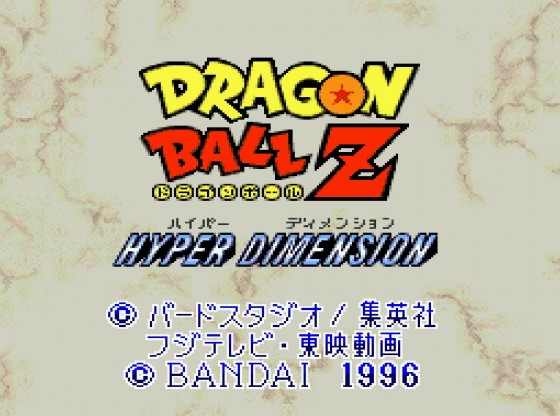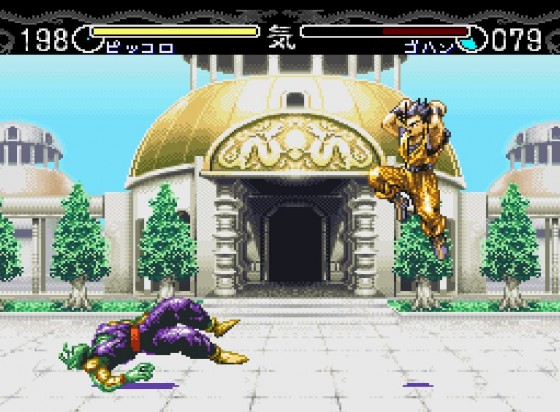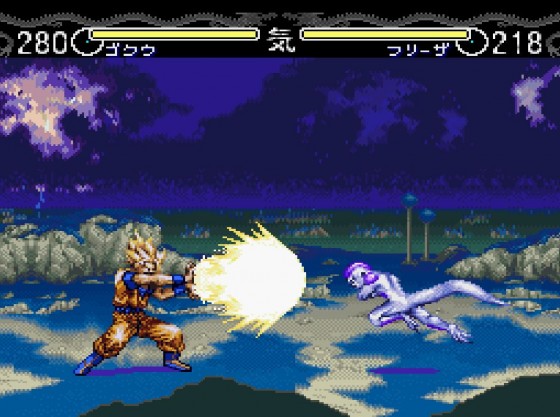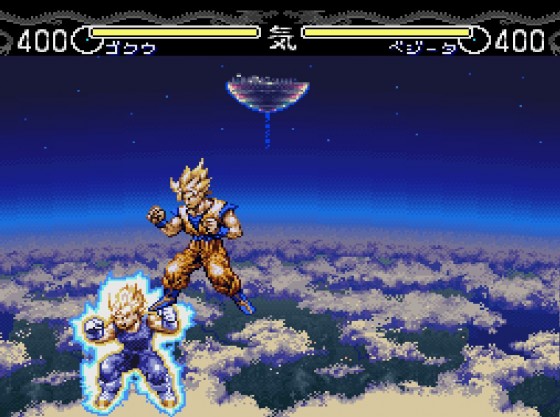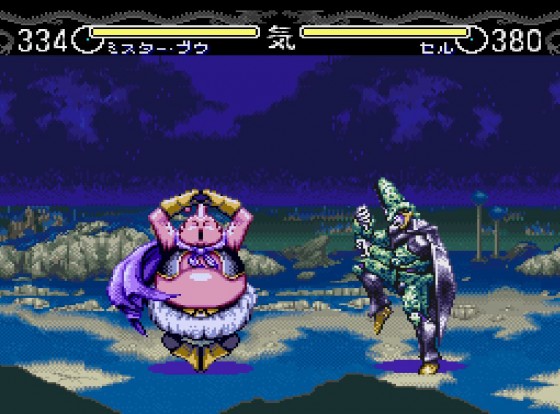Anime and video games go together like rum and coke. If there’s a reasonably popular anime, you can almost guarantee that you’re going to see a game based off it at some point. Now, when there’s a massively popular anime, you’re likely to see dozens upon dozens of games. The Dragon Ball series has been around since 1984 and has spawned games on consoles ranging from the Famicom to the PlayStation 3. Some of them were pretty fun, while some of them were dreck.
It was the Dragon Ball Z games on Super Famicom that made me take my baby steps into importing games way back in 1993. While they might not have been the most technical fighters in the world, the Super Butoden games were a lot of fun to play. In 1996, when the life of the SNES/Super Famicom was flickering out and while the Dragon Ball Z series was coming to an end in Japan, Bandai released Dragon Ball Z: Hyper Dimension.
Dragon Ball Z: Hyper Dimension took advantage of a lot of enhancements that were developed for the SNES/SFC. It uses the SA1 co-processor, which was also used in Super Mario RPG and Kirby’s Dream Land 3. The game itself was also massive compared to a most other SNES fighters, weighing in at 32Mb. All of this together made a visually impressive SNES game with very detailed backgrounds and sprites. Like most of the late generation SNES/SFC games, it really pushed what the 16-bit generation was capable of.
Story wise, Hyper Dimension loosely covers the last three major story arcs of the Dragon Ball Z saga. At the start of the story mode, you are immediately thrown into the battle with Frieza, then Perfect Cell. The rest of the game covers the Buu saga. While many fan favorites that were in the Super Butoden games are absent, such as Trunks and Android 18, the roster is pretty much what you’d expect. You have: Goku, Gohan, Vegeta, Piccolo, Vegito, Gotenks, Perfect Cell, Mister Buu, Frieza, and Kid Buu. Unlike the other games, there aren’t any hidden characters. If you don’t want to deal with the story or bought the French version that was missing the story mode entirely, you can cut to the chase and play in VS mode against another player or the CPU, or do a 8 person tournament mode as well.
Hyper Dimension plays a lot differently than most other Dragon Ball Z fighters. It offers a more traditional view instead of a split screen or zooming mechanic that many of the previous games have. Also thrown to the wayside are the cinematic powering up of the iconic attacks from the show. Turn that frown upside down, this is a good thing. Here’s why:
It was awesome to see Goku and Vegeta’s Kamehameha and Final Flash clash in the middle of the battle screen in the Super Butoden games. The result was a battle to see who could charge up the fastest and mash the A button the hardest. Instead, Hyper Dimension takes a more technical approach, requiring more skill, timing, and strategy to beat your opponents. The iconic attacks are there, but they’re not the same showstoppers that they were in the Super Butoden games. It makes the game much more fun and intense competitively. While it may not be on the level of Mark of the Wolves or Guilty Gear, Hyper Dimension is chock full of combos, cancels, and desperation moves. When playing around with what you can do, things can get pretty insane. The movesets are similar to the Super Butoden games. If you’re familiar with them, you’re going to have a nice head start on pulling some crazy moves off.
Even though Hyper Dimension is more of a traditional fighter, there are plenty of things that make it stand out. Any moves that use “energy” like fireballs and the characters signature moves will drain your health. You can also charge your energy, which causes your health bar to regenerate. There’s a number below your health bar that shows how much you have, which helps you see how much damage you’re taking and how much your super moves are draining you. There isn’t any sort of “round” system, but the fights do tend to get a little bit drawn out.
The stages are laid out in multiple “arenas”. You can bash your opponent into another arena with a special attack. Several of these arenas are in the open air, which changes up how some of your moves work. It wouldn’t be Dragon Ball Z without mid-air fighting. It’s a little clunky compared to fighting on the ground, though.
As I stated above, this is a very late generation SNES/SFC game, and it really shows. It pushes the system to its limits with heavily detailed sprites with a lot of animation to them. Many of the stages have several scrolling layers in the background which adds depth to the backgrounds. One of the stages in particular has the Earth turning beneath you using Mode 7 scaling. While it may not change in real-time, there are several different times of day in the backgrounds as well. It’s a great looking game and certainly one of the better looking fighters on the SNES/SFC.
I wouldn’t say the music falls short, but it’s not amazing either. There’s not much that stands out from it other than the title music and small handful of other tracks. Some of the other games featured instrumental renditions of Hironobu Kageyama’s songs that appeared throughout the anime, while a lot of the games had established themes for specific characters. None of these are in Hyper Dimension. A lot of the background music sounds like it could have come from any number Bandai’s other fighters. It sounds a lot like the tracks from Gundam Wing: Endless Duel or Power Rangers: The Fighting Edition. Those games had great soundtracks, so take from that what you will. I think the music might be the only thing the Super Butoden games may have done better, but it’s still quite fitting for the game.
While the Dragon Ball Z fighters usually fall into the category of guilty pleasures, I think Hyper Dimension stands out among them. While the roster could have been better, it does throw in many of the iconic villains of the series and captures the spirit of the anime well. It’s a surprisingly solid fighter, significantly more than many anime-based fighters. If you just want a game that features as many characters as possible, you might want to look into Dragon Ball Z: Shin Butoden on the Saturn, which was still reasonably fun and more in the spirit of the Super Butoden games. Either way, Dragon Ball Z: Hyper Dimension is a worthwhile game to check out and is still reasonably easy to find if you want to pick up the Super Famicom cartridge. While there’s no digital release at this point in time, I don’t think it would be outside the realm of possibility considering how popular the franchise still is. Dragon Ball Z: Hyper Dimension for EVO 2014! Let’s make it happen!
Seen it? Beat it? Ki blasted your friend in the face because he beat you too many times in a row? I want to hear about it. Comment below or drop me a line on Facebook or Twitter!

